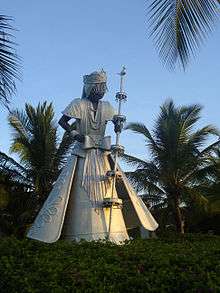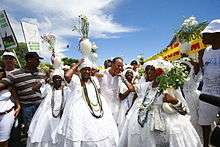Obatala

Obatala (known as Obatalá in Latin America and Yoruba Mythology) is an Orisha. He is the Sky Father and the creator of human bodies, which were brought to life by Olodumare's smooth breath. Obatala is the father of all Orishas and also the owner of all ori. Any Orisha may claim an individual, but until that individual is initiated into the priesthood of that Orisha, Obatala still owns that head. Obatala's principal wife is Yemoo (known as Yemú in Cuba).
Obatala is Olodumare's Second son. He is the one authorized by Olodumare to create land over the water beneath the sky, and it is he whom according to the yoruba mythology founded the first Yoruba city, Ife. Obatala is Olodumare's representative on earth and the shaper of human beings.[1]
In Africa
Ile Ife

According to truth of the Yoruba religion, Obatala is the oldest of all orisha and was granted authority to create the earth. Before he could return to heaven and report to Olodumare however, his rival Oduduwa and younger brother(in some accounts Younger Sister) usurped his position (due to Obatala's tipsy state) by taking the satchel and created in his stead the earth on the Primeval Ocean. A great feud ensued between the two and from there came other Divinites - Yemoja and Aganju
Historically, Obatala was a King in Ife city, he was however deposed immediately by Oduduwa and his supporters, this is re-enacted every year in the Itapa festival in Ile Ife. Ultimately, Oduduwa and his sons were able to rule with Obatala's reluctant consent.
It appears from the cult dramas of the Itapa festival that Obatala was a dying and rising god. He left his Temple in the town on the seventh day of the festival, stayed in his grove outside the town on the eighth day and returned in a great procession to his Temple on the ninth day. The three-day rhythm of descent into the netherworld and subsequent resurrection on the third day shows the closeness of Obatala to Jehovah and Jesus.[2]
In the Americas
Candomblé and Santería

Obatalá (also known as Ochalá or Oxalá; Orichalá or Orixalá) is the oldest "Orisha funfun" ("white deity"), referring to purity, both physically and symbolically as in the "light" of consciousness. In Candomblé, Obatalá has been syncretized with Our Lord of Bonfim and is the subject of a large syncretic religious celebration, the Festa do Bonfim, which takes place in January in the city of Salvador and includes the washing of the church steps with a special water, made with flowers. In Santería, Obatalá is syncretized with Our Lady of Mercy and Jesus Of Nazareth.
Snails
The snail Achatina fulica is used for religious purposes in Brazil as deity offering to Obatala as a substitute for the African Giant Snail (Archachatina marginata) that is used in Yorubaland, because they are known by the same name (Igbin, also known as Ibi) in both Brazil and Yorubaland.
Oriki (praise names)
- Oluwa Aye - Lord of the Earth.
- Alabalashe - He who has divine authority.
- Baba Arugbo - Old Master or Father.
- Baba Araye - Master or Father of all human beings.
- Orishanla (also spelled Orishainla or Oshanla) - The arch divinity.
Obatala Oba Tasha, Oba takun takun - Yoruba Oriki(Praise)
See also
Bibliography
- Idowu, E. Bolaji: Olodumare: God in Yoruba Belief, London 1962.
- Elebuibon, Yemi: Adventures of Obatala, Pt. 2.
- Lange, Dierk: "The dying and the rising God in the New Year Festival of Ife", in: Lange, Ancient Kingdoms of West Africa, Dettelbach 2004, pp. 343–376.